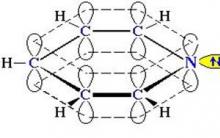In this publication, we will consider the most important from the biography of N.V. Gogol: his childhood and youth, literary path, theater, the last years of his life.
Nikolai Vasilievich Gogol (1809 - 1852) - writer, playwright, classic of Russian literature, critic, publicist. First of all, he is known for his works: the mystical story "Viy", the poem "Dead Souls", the collection "Evenings on a Farm near Dikanka", the story "Taras Bulba".
Nikolai was born into the family of a landowner in the village of Sorochintsy on March 20 (April 1), 1809. The family was large - Nikolai ended up having 11 brothers and sisters, but he himself was the third child. Education began at the Poltava school, after which it continued at the Nizhyn gymnasium, where the future great Russian writer devoted his time to justice. It is worth noting that Nikolai was only strong in drawing and Russian literature, but it did not work out with other subjects. He also tried himself in prose - the works turned out to be unsuccessful. Now it is, perhaps, difficult to imagine.
At the age of 19, Nikolai Gogol moved to St. Petersburg, where he tried to find himself. He worked as an official, but Nikolai was drawn to creativity - he tried to become an actor in a local theater, continued to try himself in literature. In the theater, Gogol was not doing very well, and the state service did not satisfy all of Nikolai's needs. Then he made up his mind - he decided to continue to engage exclusively in literature, to develop his skills and talent.
The first work of Nikolai Vasilyevich, which was published, was "Basavryuk". Later this story was revised and received the name "Evening on the eve of Ivan Kupala". It was she who became the starting point for Nikolai Gogol as a writer. This was Nikolai's first success in literature.
Gogol very often described Ukraine in his works: in "May Night", "Sorochinskaya Yarmarka", "Taras Bulba" and others. And this is not surprising, because Nikolay was born on the territory of modern Ukraine.
In 1831 Nikolai Gogol began to communicate with a representative of the literary circles of Pushkin and Zhukovsky. And it had a positive impact on his writing career.
Nikolai Vasilyevich's interest in the theater did not fade away, because his father was a famous playwright and storyteller. Gogol decided to return to the theater, but as a playwright, not an actor. His famous work "The Inspector General" was written specifically for the theater in 1835, and a year later it was staged for the first time. However, the audience did not appreciate the production and spoke negatively about it, which is why Gogol decided to leave Russia.
Nikolai Vasilievich visited Switzerland, Germany, France, Italy. It was in Rome that he decided to study the poem "Dead Souls", the basis of which he invented back in St. Petersburg. After completing work on the poem, Gogol returned to his homeland and published his first volume.
While working on the second volume, Gogol was overcome by a spiritual crisis, with which the writer could not cope. On February 11, 1852, Nikolai Vasilyevich burned all his developments on the second volume of "Dead Souls", thereby burying the poem as a continuation, and 10 days later he himself died.
This article will focus on the life of Gogol. This writer created many immortal works that rightfully occupy a worthy place in the annals of world literature. Many rumors and legends are associated with his name, some of which Nikolai Vasilyevich spread about himself. He was a great inventor and hoaxer, which, of course, was reflected in his work.
Parents
Nikolai Vasilyevich Gogol, whose biography is considered in this article, was born in 1809, on March 20, in the settlement of Velyki Sorochintsy in the Poltava province. On the paternal side, the family of the future writer had ministers of the church, but the boy's grandfather, Afanasy Demyanovich, left his spiritual career and began to work in the hetman's office. It was he who subsequently added to the surname Yanovsky received at birth another, better known - Gogol. So the ancestor of Nikolai Vasilyevich sought to emphasize his kinship with the famous in Ukrainian history Colonel Ostap Gogol, who lived in the 17th century.
The father of the future writer - Vasily Afanasyevich Gogol-Yanovsky - was an exalted and dreamy man. This can be judged by the history of his marriage to the daughter of a local landowner, Kosyarovskaya Maria Ivanovna. As a thirteen-year-old teenager, Vasily Afanasyevich saw in a dream the Mother of God, pointing to a little unknown girl as a future wife. After some time, the boy recognized the heroine of his dream in the seven-month-old daughter of the Kosyarovsky neighbors. From an early age, he tenderly courted his chosen one and married Maria Ivanovna, as soon as she was 14 years old. The Gogol family lived in great love and harmony. The biography of the writer began in 1809, when the couple finally had their firstborn, Nikolai. Parents were kind to the baby, tried in every possible way to protect him from any troubles and shocks.
Childhood
Gogol's biography, a summary of which will be useful for everyone to learn, began in truly greenhouse conditions. Dad and mom adored the baby and did not refuse him anything. In addition to him, the family had eleven other children, but most of them died in middle age. However, the greatest love, of course, was Nikolai.

The writer spent his childhood in Vasilyevka, the parental estate. The town of Kibintsy was considered the cultural center of this region. It was D.T. Troshchinsky, a former minister and distant relative of the Yanovsky-Gogols. He held the post of povet marshal (that is, he was the district leader of the nobility), and Vasily Afanasyevich was his secretary. In Kibitsy, theatrical performances were often held, in which the father of the future writer took an active part. Nikolai often attended rehearsals, was very proud of this, and at home, inspired by the work of the pope, wrote good poetry. However, Gogol's first literary experiments did not survive. And as a child, he painted well and even organized an exhibition of his paintings at his parent's estate.
Training
Together with his younger brother Ivan in 1818, Nikolai Gogol was sent to the Poltava district school. The biography of a home boy, accustomed to greenhouse conditions, followed a completely different scenario. His cozy childhood was rapidly ending. At the school, he was taught to a very tough discipline, but Nikolai did not show much zeal for the sciences. The very first holidays ended in a terrible tragedy - brother Ivan died of an unknown illness. After his death, all the hopes of his parents were placed on Nikolai. He needed to get the best education, for which he was sent to study at the Nizhyn classical gymnasium. The conditions here were very tough: children were raised every day at 5.30 am, and classes lasted from 9.00 to 17.00. In the remaining time, the students were supposed to learn their lessons and pray diligently.
However, the future writer managed to get used to local customs. Soon he made friends, famous and respected people in the future: Nestor Kukolnik, Nikolai Prokopovich, Konstantin Bazili, Alexander Danilevsky. All of them, having matured, became famous writers. And this is not surprising! While still high school students, they founded several handwritten journals: "Meteor Literature", "Dawn of the North", "Star" and others. In addition, teenagers were passionate about theater. Moreover, Gogol's creative biography could well have been different - many predicted the fate of a famous actor for him. However, the young man dreamed of public service and, after graduating from the gymnasium, resolutely went to Petersburg to pursue a career.
Official
Together with his friend from the gymnasium Danilevsky in 1828, Gogol went to the capital. Petersburg greeted young people unfriendly, they constantly needed money and tried unsuccessfully to find a decent job. At this time, Nikolai Vasilyevich is trying to make a living by literary experiments. However, his first poem "Ganz Küchelgarten" was not successful. In 1829, the writer began to serve in the department of state economy and public buildings of the Ministry of Internal Affairs, then for almost a year he worked in the department of estates under the leadership of the famous poet V.I. Panaeva. Staying in the offices of various departments helped Nikolai Vasilyevich collect a wealth of material for future works. However, the public service disappointed the writer forever. Fortunately, he was soon awaited by a truly dizzying success in the literary field.

Fame
In 1831, Evenings on a Farm near Dikanka were published. "This is real gaiety, sincere, unconstrained ..." - said Pushkin about this work. Now the personality and biography of Gogol have become interesting to the most famous people in Russia. His talent was readily recognized by everyone. Nikolai Vasilievich was overjoyed and constantly wrote letters to his mother and sisters with a request to send him more material about Little Russian folk customs.

In 1836 the famous "Petersburg story" of the writer - "The Nose" was published. This work, extremely bold for its time, ridicules the admiration for the rank in its smallest and sometimes disgusting manifestations. At the same time, Gogol creates the work "Taras Bulba". The biography and work of the writer are inextricably linked with their sweet homeland - Ukraine. In "Taras Bulba" Nikolai Vasilyevich tells about the heroic past of his country, about how the representatives of the people (Cossacks) fearlessly defended their own independence from the Polish invaders.
"Inspector"
How much trouble this play caused the author! Being a genius writer and playwright who far anticipated his time, Nikolai Vasilyevich was never able to convey to his contemporaries the meaning of his immortal work. The plot of "The Inspector General" was presented to Gogol by Pushkin. Inspired by the great poet, the author wrote it for just a few months. In the fall of 1835, the first sketches appeared, and in 1836, on January 18, the first hearing of the play was held at an evening with Zhukovsky. On April 19, the premiere of "The Inspector General" took place on the stage of the Alexandria Theater. Nicholas the First himself came to her together as an heir. They say that after watching the emperor said: “Well, a play! Everyone got it, but I got it more than anyone else! " However, Nikolai Vasilyevich was not laughing. He, a convinced monarchist, was accused of revolutionary sentiments, undermining the foundations of society, and God knows what else. But he was just trying to ridicule the abuse of local officials, his goal was morality, not politics. The distressed writer left the country and went on a long trip abroad.
Abroad
An interesting biography of Gogol abroad deserves special attention. In total, the writer spent twelve years on "saving" travels. In 1936, Nikolai Vasilyevich did not limit himself in anything: at the beginning of the summer he settled in Germany, spent the autumn in Switzerland, and came to Paris for the winter. During this time, he made great strides in writing the novel Dead Souls. The plot of the work was suggested to the author by the same Pushkin. He also praised the first chapters of the novel, admitting that Russia is, in fact, a very sad country.

In February 1837, Gogol, whose biography is interesting and instructive, moved to Rome. Here he learned about the death of Alexander Sergeevich. In despair, Nikolai Vasilyevich decided that Dead Souls was the poet's "sacred testament", which must see the light of day. In 1838 Zhukovsky came to Rome. Gogol enjoyed walking the streets of the city with the poet, painting local landscapes with him.
Return to Russia
In 1839, in September, the writer returned to Moscow. Now publishing " Dead souls"The creative biography of Gogol is dedicated. A summary of the work is already known to many friends of Nikolai Vasilyevich. He read individual chapters of the novel in the Aksakovs' house, at Prokopovich's and Zhukovsky's. His closest circle of friends became his listeners. All of them were delighted with Gogol's creation. In 1842, , in May, saw the light of the first publication of "Dead Souls." At first, reviews of the work were mostly positive, then the initiative was intercepted by the ill-wishers of Nikolai Vasilievich. They accused the writer of slander, caricature, farce. A truly devastating article was written by N. A. Polevoy. Nikolai Vasilievich Gogol did not take part in all this controversy.The biography of the writer continued abroad again.
Matters of the heart

Gogol has never been married. Very little is known about his serious ties with women. Smirnova Alexandra Osipovna was his old and devoted friend. When she came to Rome, Nikolai Vasilyevich became her guide in the ancient city. In addition, there was a very lively correspondence between friends. However, the woman was married, so the relationship between her and the writer was only platonic. Gogol's biography is adorned with another heartfelt passion. Short story his personal relationship with women says: once the writer decided to get married. He became interested in the young Countess Anna Villegorskaya and in the late 1940s proposed to her. The girl's parents were against this marriage, and the writer was refused. Nikolai Vasilyevich was greatly depressed by this story, and since then has not tried to arrange his personal life.
Work on the second volume
Before leaving, the author of Dead Souls decided to publish the first collection of his own works. He, as always, needed money. However, he himself did not want to deal with this troublesome business and entrusted this business to his friend Prokopovich. In the summer of 1842, the writer was in Germany, and in the fall he moved to Rome. Here he worked on the second volume of Dead Souls. Almost the entire creative biography of Gogol is devoted to writing this novel. The most important thing he wanted to do at that moment was to show the image of an ideal citizen of Russia: smart, strong and principled. However, the work progressed with great difficulty, and at the beginning of 1845 the writer showed the first signs of a large-scale mental crisis.
Last years
The writer continued to write his novel, but was increasingly distracted by other matters. For example, he composed The Inspector General's Denouement, which radically changed the entire previous interpretation of the play. Then, in 1847, Selected Passages from Correspondence with Friends were published in St. Petersburg. In this book, Nikolai Vasilyevich tried to explain why the second volume of Dead Souls has not yet been written, and expressed doubts about the educational role of fiction.

A whole storm of public indignation fell upon the writer. "Selected Places ..." is the most controversial moment that marked Gogol's creative biography. A brief history of the creation of this work suggests that it was written in a moment of the writer's mental confusion, his desire to move away from previous positions and start a new life.
Burning of manuscripts
In general, the writer burned his works several times. This, one might say, was his bad habit. In 1829 he did the same with his poem "Hans Kuchelgarten", and in 1840 - with the Little Russian tragedy "Shaved Mustache", which he could not impress Zhukovsky. At the beginning of 1845, the writer's health deteriorated sharply, he constantly consulted with various medical celebrities and went to water resorts for treatment. He visited Dresden, Berlin, Halle, but could not improve his health. The writer's religious exaltation gradually increased. He often communicated with his confessor, Father Matthew. He believed that literary creativity distracts from inner life and demanded from the writer that he renounce his gift of God. As a result, on February 11, 1852, Gogol's biography was marked by a fateful event. The most important creation of his life - the second volume of Dead Souls - was mercilessly burned by him.
Death
In April 1848, Gogol returned to Russia. He spent most of his time in Moscow, sometimes he came to St. Petersburg and to his homeland, to Ukraine. The writer read individual chapters from the second volume of "Dead Souls" to friends, once again bathed in the rays of universal love and worship. Nikolai Vasilyevich came to the production of "The Inspector General" at the Maly Theater and is satisfied with the performance. In January 1852 it became known that the novel was "completely over." However, soon the biography of Gogol was marked with a new mental crisis. The main business of his whole life - literary creation - seemed useless to him. He burned the second volume of Dead Souls and a few days later (February 21, 1852) died in Moscow. He was buried in the cemetery of St. Danilov Monastery, and in 1931 he was transferred to the Novodevichy cemetery.
Posthumous testament
This is the biography of Gogol. Interesting Facts from his life are largely associated with his posthumous testament. It is well known that he asked not to put a monument over his grave and not to bury it for several weeks, as sometimes the writer fell into a kind of lethargic sleep. Both of the writer's wishes were violated. Gogol was buried a few days after his death, and in 1957 a marble bust by Tomsk Nikolai was installed at the burial place of Nikolai Vasilyevich.
Born on March 20 (April 1), 1809 in the village of Sorochintsy, Poltava province, in the family of a landowner. Gogol was the third child, and there were 12 children in the family.
Training in the biography of Gogol took place at the Poltava School. Then in 1821 he entered the class of the Nizhyn gymnasium, where he studied justice. During his school years, the writer did not have any special abilities in his studies. Only drawing lessons and the study of Russian literature were good for him. He managed to write only mediocre works.
The beginning of the literary path
In 1828, in the life of Gogol, he moved to St. Petersburg. There he served as an official, tried to get a job in the theater as an actor and studied literature. The acting career did not go well, and the service did not bring pleasure to Gogol, and sometimes even weighed down. And the writer decided to prove himself in the literary field.
In 1831, Gogol met with representatives of the literary circles of Zhukovsky and Pushkin, undoubtedly these acquaintances strongly influenced his further fate and literary activity.
Gogol and theater
Nikolai Vasilyevich Gogol's interest in the theater manifested itself in his youth, after the death of his father, a wonderful playwright and storyteller.
Realizing the full power of the theater, Gogol took up drama. Gogol's work "The Inspector General" was written in 1835, and staged for the first time in 1836. Due to the negative reaction of the public to the production of The Inspector General, the writer leaves the country.
last years of life
In 1836, in the biography of Nikolai Gogol, he traveled to Switzerland, Germany, Italy, and also a short stay in Paris. Then, from March 1837, work continued in Rome on the first volume of Gogol's greatest work "Dead Souls", which was conceived by the author back in St. Petersburg. After returning home from Rome, the writer publishes the first volume of the poem. While working on the second volume, Gogol experienced a spiritual crisis. Even a trip to Jerusalem did not help correct the situation.
At the beginning of 1843, Gogol's famous story "The Overcoat" was first published.
Chronological table
Other biography options
- The writer was fond of mysticism and religion. The most mysterious work of Gogol is considered the story "Viy", created, according to the author himself, on the basis of the Ukrainian folk legends. However, literary scholars and historians still cannot find evidence of this, which indicates the exclusive authorship of the mystifier writer.
- It is also believed that a few days before his death, the great writer burned the second volume of Dead Souls. Some scientists consider this to be an unreliable fact, but no one will ever know the truth.
- It is still not known for certain how exactly the writer died. One of the main versions says that Gogol was buried alive. The proof of this was the change in the position of his body during the reburial.
- see all
Nikolai Gogol biography brieflyset out in this article.
Nikolay Gogol short biography
Nikolai Vasilyevich Gogol - Russian prose writer, playwright, poet, critic, publicist, recognized as one of the classics of Russian literature.
Born in the village of Sorochintsy, Poltava province, into a poor landowner family April 1 in 1809.
Gogol began his education in 1821 at the Nizhyn Gymnasium of Higher Sciences. In 1828, Gogol moved to St. Petersburg, where he served as an official.
There he was a little disappointed, since there was not enough money for subsistence, he was not accepted as an actor, literary activity did not work out. Under the pseudonym V. Alov in 1829 he wrote the romantic work "Ganz Kuchelgarten". After harsh criticism of the book, he himself destroyed its circulation.
Gogol's first story "Basavryuk" appeared in 1830 in the journal Otechestvennye zapiski. Gradually he began to make acquaintances with the literary circle of St. Petersburg. He communicated with O. Somov, Baron Delvig, P. Pletnev, and Zhukovsky.
Gogol's new works gradually appeared in print. Among them, "Evening on the eve of Ivan Kupala", "Sorochinskaya Yarmarka", "May Night". In the almanac "Northern Flowers" a chapter of the historical novel "Hetman" was published. However, his first major literary success was "Evenings on a Farm near Dikanka." In these stories, the author has incredibly vividly depicted Ukrainian life, using fun and subtle humor.
In 1833, the writer decided to devote himself to teaching, and a year later he was appointed assistant professor at the Department of History of St. Petersburg University. During this period, he devoted himself entirely to the study of the history of Ukraine, which later formed the basis for the idea of \u200b\u200bTaras Bulba (1835).
Realizing the full power of the theater, Gogol took up drama. Gogol's work "The Inspector General" was written in 1835, and staged for the first time in 1836. Due to the negative reaction of the public to the production of The Inspector General, the writer leaves the country.
Shortly thereafter, the writer went abroad to Switzerland, Paris, where he completed his work Dead Souls. In 1841, returning to Russia, with the help of Belinsky, he made sure that the first volume of Dead Souls was published. The second volume reflected the spiritual crisis that overtook the writer by that time.
Soon Gogol's state of mind worsened. On the night of February 11, 1852, Gogol burned the second volume, and 21 february died.
Role and place in literature
Nikolai Vasilievich Gogol is an outstanding classic of Russian literature XIX centuries. He made a great contribution to drama and journalism. According to many literary critics, Gogol founded a special trend called the "natural school". The writer, with his work, influenced the development of the Russian language, focusing on its nationality.
Origins and early years
N.V. Gogol was born on March 20, 1809 in the Poltava province (Ukraine) in the village of Velyki Sorochintsy. Nikolai was born the third child in the family of a landowner (there were 12 children in total).
The future writer belonged to an old Cossack family. It is possible that the ancestor was hetman Ostap Gogol himself.
Father - Vasily Afanasevich Gogol-Yanovsky. He was engaged in stage activities and instilled in his son a love for the theater. When Nikolai was only 16 years old, he was gone.
Mother - Maria Ivanovna Gogol-Yanovskaya (nee Kosyarovskaya). She got married at a young age (14 years old). Her beautiful appearance was admired by many contemporaries. Nikolai became her first child who was born alive. And so it was named after St. Nicholas.
Nikolai spent his childhood in a village in Ukraine. The traditions and life of the Ukrainian people strongly influenced the future creative activity of the writer. And the mother's religiosity was passed on to her son and also reflected in many of his works.
Education and work
When Gogol was ten years old, he was sent to Poltava to prepare for his studies at the gymnasium. He was taught by one local teacher, thanks to whom, in 1821, Nikolai entered the Gymnasium of Higher Sciences in Nizhyn. Gogol's academic performance left much to be desired. He was only strong in drawing and Russian literature. Although Gogol's academic success was not great, the Gymnasium itself is to blame. The teaching methods were outdated and unproductive: cramming and rods. Therefore, Gogol took up self-education: he subscribed to magazines with his comrades, was fond of theater.
After graduating from the gymnasium, Gogol moved to St. Petersburg, hoping for a bright future here. But reality disappointed him a little. His attempts to become an actor failed. In 1829, he became a minor official, a scribe in the department of the ministry, but he did not work there for long, being disappointed in this matter.
Creation
Work as an official did not bring joy to Nikolai Gogol, so he tries himself in literary activity. The first published work - "Evening on the eve of Ivan Kupala" (at first had a different name). Gogol's fame began with this story.
The popularity of Gogol's works was explained by the interest of the St. Petersburg public in Little Russian (as some regions of Ukraine were previously called) being.
In his work, Gogol often turned to folk legends, beliefs, and used simple folk speech.
The early works of Nikolai Gogol belong to the direction of romanticism. Later he writes in his original style, many associate it with realism.
Major works
The first work that brought him fame was the collection Evenings on a Farm near Dikanka. These stories belong to the main works of Gogol. In them, the author stunningly accurately reflected the traditions of the Ukrainian people. And the magic that lies in the pages of this book amazes readers even now.
Important works include historical story "Taras Bulba". It is included in the series of stories "Mirogorod". The dramatic fate of the heroes against the background of real events makes a strong impression. Films have been made based on the story.
One of the great achievements in the field of Gogol's drama was the play The Inspector General. The comedy boldly exposed the vices of Russian officials.
Last years
1836 was a time for Gogol to travel to Europe. He is working on the first part of Dead Souls. Returning to his homeland, the author publishes it.
In 1843, Gogol published the short story "The Overcoat".
There is a version that Gogol burned the second volume of Dead Souls on February 11, 1852. And in the same year he was gone.
Chronological table (by dates)
| Year (years) | Event |
| 1809 | Year of birth N.V. Gogol |
| 1821-1828 | Years of study at the Nizhyn gymnasium |
| 1828 | Moving to St. Petersburg |
| 1830 | The story "Evening on the eve of Ivan Kupala" |
| 1831-1832 | Collection "Evenings on a Farm near Dikanka" |
| 1836 | Completed work on the play "The Inspector General" |
| 1848 | Trip to Jerusalem |
| 1852 | Nikolai Gogol died |
Interesting facts from the life of the writer
- Passion for mysticism led to the writing of the most mysterious work of Gogol - "Viy".
- There is a version that the author burned the second volume of Dead Souls.
- Nikolai Gogol had a passion for miniature publications.
Museum of the writer
In 1984, a museum was opened in the village of Gogolevo in a solemn atmosphere.











Pink wallpaper: delicate color interior
What time was the founding of MGU
Manganese (II) Bromide Composition and Molar Mass Molar Mass Calculation
Method of obtaining peroxidase from horseradish roots Electrochemical behavior of horseradish peroxidase substrates
What kind of radiation belongs to photon radiation Photon radiation is divided into X-ray and